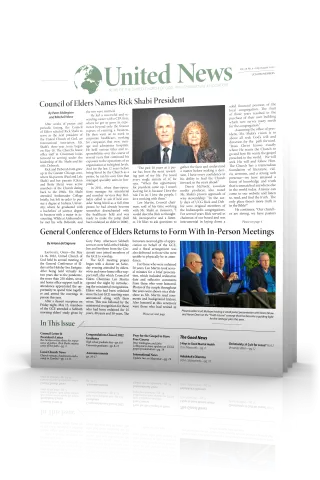Christianity: A Cult for Jesus? Part 2
In this three-part series, let’s briefly examine the historicity of Jesus’ resurrection from the dead, the nature of Jesus in the context of modern cult worship, and how one might discern whether the cultivation of Christianity is based on authentic design or cultish forgery.
When we hear the word “cult,” we often think of a group of people who follow a deranged and charismatic figure, who abuses them under the guise of divine revelation. Their followers are often convinced of strange and nonsensical ideas, and act in ways that outsiders of the cult—sometimes even belonging to the same “faith”—are left bewildered and deeply concerned about.
In the time that Jesus was alive, the respected religious leaders of the Jews challenged the claims that Jesus made about His identity and feared what would happen if His following kept growing. If a man was fanatical and blasphemous enough to claim to actually be and act as God, then they concluded He must have been led by demons, and needed to be stopped immediately (Matthew 12:22-28). One might even suggest that they viewed Him as a cult leader, if we were to put a modern lens on top of their worldview.
So, was Jesus a neurotic individual who was so disillusioned about His identity that He deceived others into believing His own unorthodox beliefs about being God? How do we know that His claims aren’t comparable to what we might expect from a cult? In part one, we looked into how Jesus substantiated His claims to be God in the flesh through His historically corroborated resurrection from the dead. In part two, let’s look into the character and works of Jesus and see if His life fits the mold of our modern understanding of cult leadership.
A madman or something worse
First, we have to lay the cards on the table. There is no doubt that Jesus taught and believed that He was the Son of God, incarnate. Jesus overtly claimed to be divine, and taught those who followed Him to believe in His identity in order to receive forgiveness and eternal life (John 3:16). Claims such as these were a criminal offense according to the Hebrew faith, and were punishable by death. So, either He was a deranged leader of His religious faith, or He truly was who He claimed to be. There really was no in between.
As C.S. Lewis expressed so well in his book, Mere Christianity, “[Let us not dare to say,] ‘I’m ready to accept Jesus as a great moral teacher, but [not] accept His claim to be God.’ That is the one thing we must not say. A man who was merely a man and said the sort of things Jesus said would not be a great moral teacher . . . Either this man was, and is the Son of God: or else a madman or something worse . . . let us not come up with any patronizing nonsense about His being a great human teacher. He has not left that open to us. He didn’t intend to” (C.S. Lewis, Mere Christianity, pg. 52, 40, 41).
The persona of a cult leader
While a cult leader often appears to be harmless, time reveals what lies under the surface of the deceitful individual. A cult leader typically displays mental instability and narcissism; and their obsession for worship and blind obedience often isolates their followers from society, and conceals the types of abuses being perpetrated on them from the outside world. However, when we look at Jesus, nothing about His temperament, character or actions seemed to fit this typical persona of a cult leader.
For example, instead of controlling His self-image, Jesus allowed the Pharisees (a sect of the Jews) to openly and publicly criticize Him and did not retaliate in return for their insults. To those who loved Him and worshipped at His feet, He treated them without a shred of egotism or partiality, which is not the nature of cult leadership.
Instead of estranging and alienating His followers from the world, He also commanded them to love and serve all of humanity. He set the example Himself and cared for everyone–including the “inferior” individuals in His society and those who committed crimes against Him personally. Even up to His death, when His enemies accused Him of being a fraudulent blasphemer, He paid the ultimate price for who He was claiming to be and offered to forgive those who killed Him wrongfully. By contrast, someone who is leading a cult might have taken their followers away and killed them alongside their own selves, for fear of the truth being exposed.
The expression of His character was unlike anything humanity has ever seen. “His unworldliness was free from indifference and unsociability, His dignity from pride and presumption . . . His self-denial from moroseness, His temperance from austerity . . . absorbing devotion to God with untiring interest in the welfare of men.” (Schaff, PC, 63; as quoted in Evidence for Christianity, p. 422). Even when tried under Roman law, He couldn’t be charged for anything wrong He had ever done. He was condemned by the Jews only for whom He claimed to be. He was perfect—and that was a trait not even the greatest con man would have achieved.
Miracles, prophecies, and existence
Aside from His perfection being a self-evident expression of His divinity, let’s look at other ways in which Jesus demonstrated His identity: through His fulfillment of prophecies and performance of miracles. There are at least 300 prophecies that were written about whom the “Messiah” would be, centuries and millennia before Jesus entered the world scene. Somehow, Jesus fulfilled them all.
These were prophecies which no person could pre-arrange in order to manipulate a new cult following. For example, “If you calculate[d] the improbability of any one person fulfilling, sheerly by chance, all of the Old testament Messianic prophecies that Jesus fulfilled, it would be astronomical as winning the lottery every day for a century” (Peter Kreeft, Christianity for Modern Pagans, p. 264).
No one could “have the power to arrange the time, place, events, and circumstances [which] surrounded their birth or events after [their] death” as Jesus did (Louise Lapides, the Case for Christ, p. 248). Yet, we see countless scriptures laying out every detail of these events which took place in Jesus’ life, which are corroborated by biblical and historical accounts alike. “Even though the Jewish Talmud refers to Jesus in derogatory ways, it never once makes the claim that the fulfillment of prophecies was falsified. Not one time” (Louise Lapides, The Case for Christ, p. 248).
When Jesus claimed to be God, He also backed up those claims with powerful healings and command over nature itself. Events such as curing lifelong blindness or leprosy, calming the sea, turning water into wine and raising people from the dead cannot be so easily explained away from a naturalistic worldview. Although the Western world might reject any notion of a miraculous event being credible, we can’t fairly weigh the evidence Jesus presented if we are only willing to examine it with the bias of an anti-supernaturalistic mind.
“‘If miracles,’ writes Bernard Ramm, ‘are capable of sensory perception, they can be matters of testimony. If they are adequately testified to, then the recorded testimony has the same validity for evidence as the experiences of beholding the events’” (Ramm, PCE, p. 140 as quoted in Evidence for Christianity, p. 419). And, not even His greatest critics could deny the supernatural events they had seen. Instead, they concluded that His power had come from demons, but in all actuality, it’d be more likely that His power, abilities, and love came from being God.
Who do you say that I am?
Though there are many avenues to investigate the divinity of Jesus, perhaps His greatest miracle—being perfect—says it all. Endless books could be written on the nature and teachings of Jesus, and have been written for the past two millennia. And perhaps that’s the point. His divine nature was and is self-evident to anyone who comes to know Him, unlike a cult leader.
By the same token, Jesus backed up His divinity not only with His resurrection from the dead, but also with His fulfillment of prophecy, and by the miraculous events He performed. These events were done publicly, which grants Him exceedingly more credibility than a cult leader, because this left himself “open to scrutiny and investigation by anyone, including skeptics” (Evidence for Christianity, p. 419). And we know that if one couldn’t accept that He was God, then they could only explain away His acts by some demonic spiritual power.
So, when we consider Jesus’ life under the lens of cult leadership, let’s consider the evidence that Jesus provided to back up His divinity, and ask the question Jesus posed to His own disciples, “But who do you say that I am?” (Matthew 16:15).
Next time, we will look at the history and cultivation of Christianity to see whether faith in Jesus was made by authentic design or cultish forgery.





